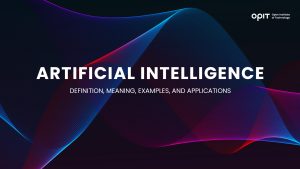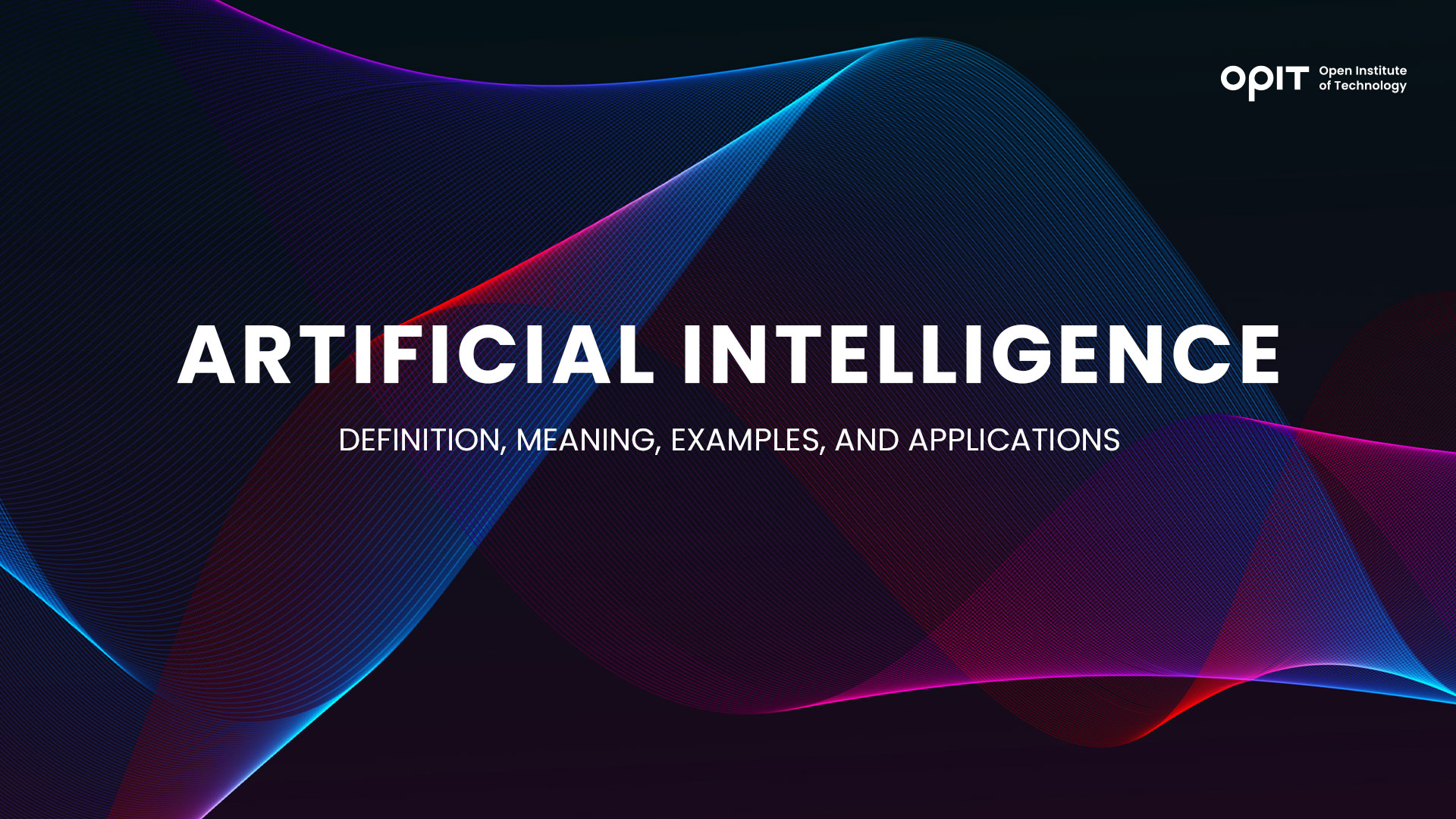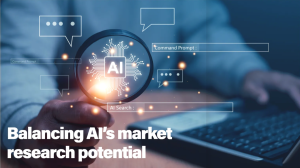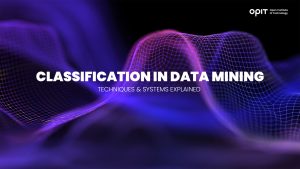

The artificial intelligence market was estimated to be worth $136 billion in 2022, with projections of up to $1,800 billion by the end of the decade. More than a third of companies today implement AI in their business processes, and over 40% will consider doing so in the future.
These whopping numbers testify to the importance, prevalence, and reality of AI in the modern world. If you’re considering an education in AI, you’re looking at a highly rewarding and prosperous future career. But what are the applications of artificial intelligence, and how did it all begin? Let’s start from scratch.
What Is Artificial Intelligence?
Artificial intelligence definition describes AI as a part of computer science that focuses on building programs and software with human intelligence. There are four types of artificial intelligence: the theory of mind, reactive, self-aware, and limited memory.
Reactive AI masters one field, like playing chess, performing a single manufacturing task, and similar. Limited memory machines can gather and remember information and use findings to offer recommendations (hotels, restaurants, etc.).
Theory of mind is a more developed type of AI capable of understanding human emotions. These machines can also take part in social interactions. Finally, self-aware AI is a conscious machine, but its development is reserved for the future.
History of Artificial Intelligence
The concept of artificial intelligence has roots in the 1950s. This was when AI became an academic discipline, and scientists started publishing papers about it. It all started with Alan Turing and his paper about computer machinery and intelligence that introduced basic AI concepts.
Here are some important milestones in the artificial intelligence field:
- 1952 – Arthur Samuel created a program that taught itself to play checkers.
- 1955 – John McCarthy’s workshop on AI, where the term was used for the first time.
- 1961 – First robot worker on a General Motors factory’s assembly line.
- 1980 – First conference on AI.
- 1986 – Demonstration of the first driverless car.
- 1997 – A program beat Gary Kasparov in a legendary chess match, thus becoming the first AI tool to win in a competition over a human.
- 2000 – Development of a robot that simulates a person’s body movement and human emotions.
AI in the 21st Century
The 21st century has witnessed some of the fastest advancements and applications of artificial intelligence across industries. Robots are becoming more sophisticated, they land on other planets, work in shops, clean, and much more. Global corporations like Facebook, Twitter, Netflix, and others regularly use AI tools in marketing to boost user experience, etc.
We’re also seeing the rise of AI chatbots like ChatGPT that can create content indistinguishable from human content.
Fields Used in Artificial Intelligence
Artificial intelligence relies on the use of numerous technologies:
- Machine Learning – Making apps and processes that can perform tasks like humans.
- Natural Language Processing – Training computers to understand words like humans.
- Computer Vision – Developing tools and programs that can read visual data and take information from it.
- Robotics – Programming agents to perform tasks in the physical world.
Applications of Artificial Intelligence
Below is an overview of applications of artificial intelligence across industries.
Automation
Any business and sector that relies on automation can use AI tools for faster data processing. By implementing advanced artificial intelligence tools into daily processes, you can save time and resources.
Healthcare
Fraud is common in healthcare. AI in this field is mostly oriented toward lowering the risk of fraud and administrative fees. For example, using AI makes it possible to check insurance claims and find inconsistencies.
Similarly, AI can help advance and finetune medical research, telemedicine, medical training, patient engagement, and support. There’s virtually no aspect of healthcare and medicine that couldn’t benefit from AI.
Business
Businesses across industries benefit from AI to finetune various aspects like the hiring process, threat detection, analytics, task automation, and more. Business owners and managers can make better-informed business decisions with less risk of error.
Education
Modern-day education offers personalized programs tailored to the individual learner’s abilities and goals. By automating tasks with AI tools, teachers can spend more time helping students progress faster in their studies.
Security
Security has never been more important following the rise of web applications, online shopping, and data sharing. With so much sensitive information shared daily, AI can help increase data protection and mitigate hacking attacks and threats. Systems with AI features can diagnose, scan, and detect threats.
Benefits and Challenges of Artificial Intelligence
There are enormous benefits of AI applications that can revolutionize any industry. Here are just some of them:
Automation and Increased Efficiency
AI helps streamline repetitive tasks, automate processes, and boost work efficiency. This characteristic of AI is already visible in all industries, and the use of programming languages like R and Python makes it all possible.
Improved Decision Making
Stakeholders can use AI to analyze immense amounts of data (with millions or billions of pieces of information) and make better-informed business decisions. Compare this to limited data analysis of the past, where researchers only had access to local documents or libraries, and you can understand how AI empowers present-day business owners.
Cost Savings
By automating tasks and streamlining processes, businesses also spend less money. Savings in terms of energy, extra work hour costs, materials, and even HR are significant. When you use AI right, you can turn almost any project into reality with minimal cost.
Challenges of AI
Despite the numerous benefits, AI also comes with a few challenges:
Data Privacy and Security
All AI developments take place online. The web still lacks proper laws on data protection and privacy, and it’s highly possible that user data is being used without consent in AI projects worldwide. Until strict laws are enacted, AI will continue to pose a threat to data privacy.
Algorithmic Bias
Algorithms today assist humans in decision-making. Stakeholders and regular users rely on data provided by AI tools to complete or approach tasks and even form new beliefs and behaviors. Poorly trained machines can encourage human biases, which can be especially harmful.
Job Less
AI is developing at the speed of light. Many tools are already replacing human labor in both the physical and digital worlds. A question remains to what degree machines will overtake the labor market in the future.
Artificial Intelligence Examples
Let’s look at real-world examples of artificial intelligence across applications and industries.
Virtual Assistants
Apple was the first company to introduce a virtual assistant based on AI. We know the tool today by the name of Siri. Numerous other companies like Amazon and Google have followed suit, so now we have Alexa, Google Assistant, and many other AI talking assistants.
Recommendation Systems
Users today find it ever more challenging to resist addictive content online. We’re often glued to our phones because our Instagram feed keeps suggesting must-watch Reels. The same goes for Netflix and its binge-worthy shows. These platforms use AI to enhance their recommendation system and offer ads, TV shows, or videos you love.
Shopping on Amazon works in a similar fashion. Even Spotify uses AI to offer audio recommendations to customers. It relies on your previous search history, liked content, and similar data to provide new suggestions.
Autonomous Vehicles
New-age vehicles powered by AI have sophisticated systems that make commuting easier than ever. Tesla’s latest AI software can collect information in real-time from the multiple cameras on the vehicles. The AI makes a 3D map with roads, obstacles, traffic lights, and other elements to make your ride safer.
Waymo has a similar system of lidar sensors around the vehicles that send pulsations around the car and offer an overview of the car’s surroundings.
Fraud Detection
Banks and credit card companies implement AI algorithms to prevent fraud. Advanced software helps these companies understand their customers and prevent non-authorized users from making payments or completing other unauthorized actions.
Image and Voice Recognition
If you have a newer smartphone, you’re already familiar with Face ID and voice assistant tools. These are built on basic AI principles and are being integrated into broader systems like vehicles, vending machines, home appliances, and more.
Deep Learning
Artificial intelligence encompasses both deep learning and machine learning. Machine learning encompasses deep learning and uses algorithms that learn from data, explore patterns, and predict outputs.
Deep learning relies on sophisticated neural networks similar to the networks in the human brain. Deep learning specialists use these neural networks to pinpoint patterns in large data sets.
Artificial Intelligence Continues to Grow and Develop
Although predicting the future is impossible, numerous AI specialists expect to see further development in this computer science discipline. More businesses will start implementing AI and we’ll see more autonomous vehicles and smarter robotics. That said, it’s increasingly important to take into account ethical considerations. As long as we use AI ethically, there’s no danger to our social interactions and privacy.
Related posts

Source:
- EFMD Global, Published on July 12th, 2024.
By Stephanie Mullins
Many people love to read the stories of successful business school graduates to see what they’ve achieved using the lessons, insights and connections from the programmes they’ve studied. We speak to one alumnus, Riccardo Ocleppo, who studied at top business schools including London Business School (LBS) and INSEAD, about the education institution called OPIT which he created after business school.
Please introduce yourself and your career to date.
I am the founder of OPIT — Open Institute of Technology, a fully accredited Higher Education Institution (HEI) under the European Qualification Framework (EQF) by the MFHEA Authority. OPIT also partners with WES (World Education Services), a trusted non-profit providing verified education credential assessments (ECA) in the US and Canada for foreign degrees and certificates.
Prior to founding OPIT, I established Docsity, a global community boasting 15 million registered university students worldwide and partnerships with over 250 Universities and Business Schools. My academic background includes an MSc in Electronics from Politecnico di Torino and an MSc in Management from London Business School.
Why did you decide to create OPIT Open Institute of Technology?
Higher education has a profound impact on people’s futures. Through quality higher education, people can aspire to a better and more fulfilling future.
The mission behind OPIT is to democratise access to high-quality higher education in the fields that will be in high demand in the coming decades: Computer Science, Artificial Intelligence, Data Science, Cybersecurity, and Digital Innovation.
Since launching my first company in the education field, I’ve engaged with countless students, partnered with hundreds of universities, and collaborated with professors and companies. Through these interactions, I’ve observed a gap between traditional university curricula and the skills demanded by today’s job market, particularly in Computer Science and Technology.
I founded OPIT to bridge this gap by modernising education, making it affordable, and enhancing the digital learning experience. By collaborating with international professors and forging solid relationships with global companies, we are creating a dynamic online community and developing high-quality digital learning content. This approach ensures our students benefit from a flexible, cutting-edge, and stress-free learning environment.
Why do you think an education in tech is relevant in today’s business landscape?

As depicted by the World Economic Forum’s “Future of Jobs 2023” report, the demand for skilled tech professionals remains (and will remain) robust across industries, driven by the critical role of advanced technologies in business success.
Today’s companies require individuals who can innovate and execute complex solutions. A degree in fields like computer science, cybersecurity, data science, digital business or AI equips graduates with essential skills to thrive in this dynamic industry.
According to the International Monetary Fund (IMF), the global tech talent shortage will exceed 85 million workers by 2030. The Korn Ferry Institute warns that this gap could result in hundreds of billions in lost revenue across the US, Europe, and Asia.
To address this challenge, OPIT aims to democratise access to technology education. Our competency-based and applied approach, coupled with a flexible online learning experience, empowers students to progress at their own pace, demonstrating their skills as they advance.
Read the full article below:

Source:
- The European, Summer 2024 Edition, Page 24
With careful planning, ethical considerations, and ensuring human oversight is maintained, AI can have huge market research benefits, says Lorenzo Livi of the Open Institute of Technology.
By Lorenzo Livi
To market well, you need to get something interesting in front of those who are interested. That takes a lot of thinking, a lot of work, and a whole bunch of research. But what if the bulk of that thinking, work and research could be done for you? What would that mean for marketing as an industry, and market research specifically?
With the recent explosion of AI onto the world stage, big changes are coming in the marketing industry. But will AI be able to do market research as successfully? Simply, the answer is yes. A big, fat, resounding yes. In fact, AI has the potential to revolutionise market research.
Ensuring that people have a clear understanding of what exactly AI is is crucial, given its seismic effect on our world. Common questions that even occur amongst people at the forefront of marketing, such as, “Who invented AI?” or, “Where is the main AI system located?” highlight a widespread misunderstanding about the nature of AI.
As for the notion of a central “main thing” running AI, it’s essential to clarify that AI systems exist in various forms and locations. AI algorithms and models can run on individual computers, servers, or even specialized hardware designed for AI processing, commonly referred to as AI chips. These systems can be distributed across multiple locations, including data centres, cloud platforms, and edge devices. They can also be used anywhere, so long as you have a compatible device and an internet connection.
While the concept of AI may seem abstract or mysterious to some, it’s important to approach it with a clear understanding of its principles and applications. By promoting education and awareness about AI, we can dispel misconceptions and facilitate meaningful conversations about its role in society.
Read the full article below:
- The European, Pages 24 to 26.
Have questions?
Visit our FAQ page or get in touch with us!
Write us at +39 335 576 0263
Get in touch at hello@opit.com
Talk to one of our Study Advisors
We are international
We can speak in:

